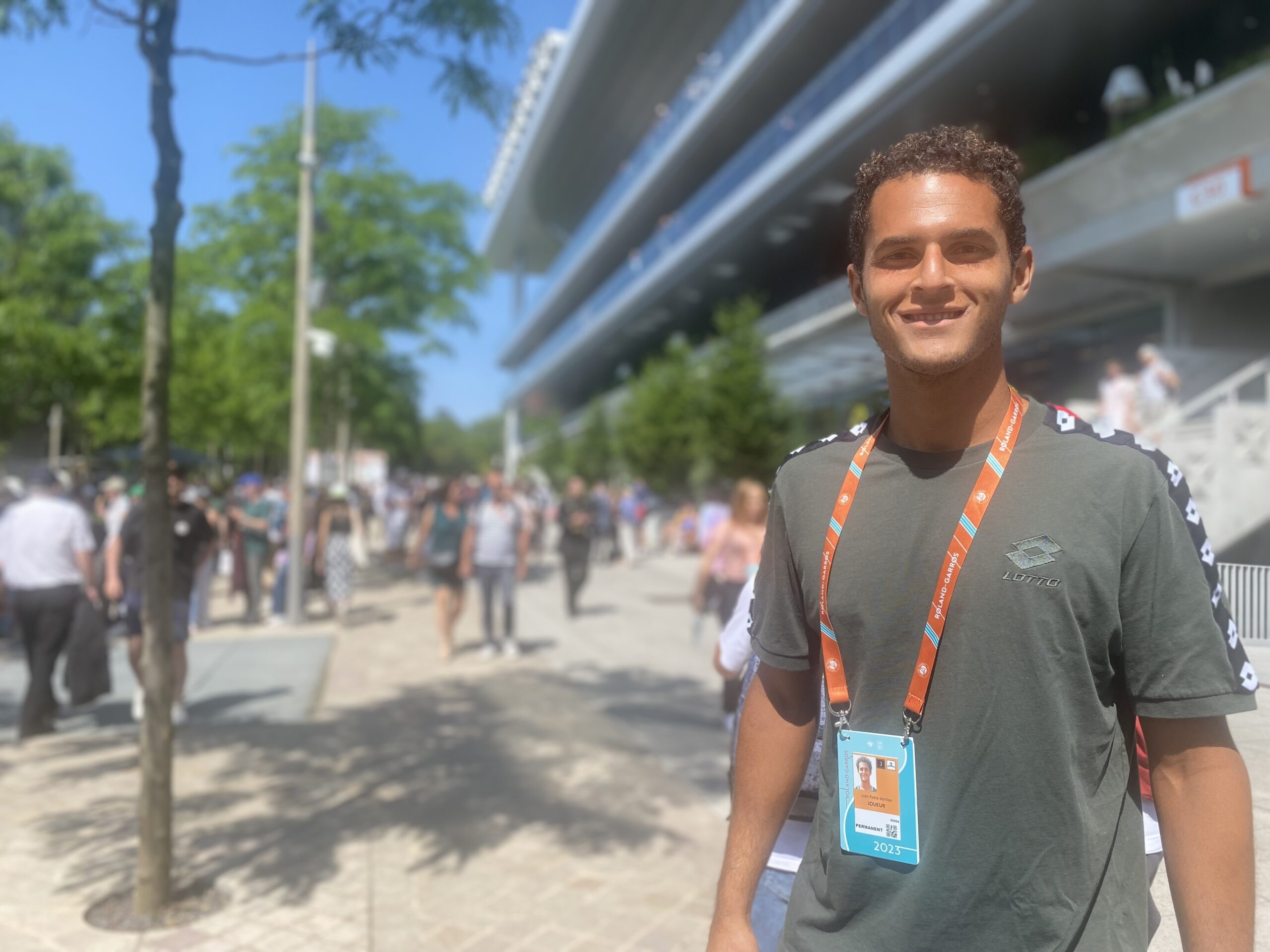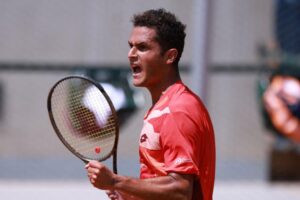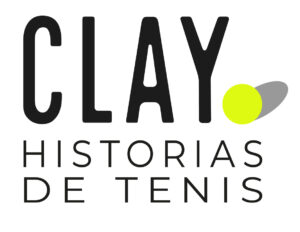
Varillas, the surprise of Roland Garros who wants to ruin Djokovic’s party: “When you step on the court you are 50-50”.
PARIS – Juan Pablo Varillas has been watching Peru from afar for six years, although he never stops thinking about Peru. This Sunday, when the world No. 94 will step onto the Philippe Chatrier stadium for the most important match of his life, he will do so as a grateful man: to his parents, because without their support he would not be one of the biggest surprises at Roland Garros, and to Argentina, for passing on his winning mentality to him.
“In Argentina they have a winning and professional mentality. That’s very important, it’s made that atmosphere contagious and I want to keep growing and motivating myself to achieve success,” said Juan Pablo Varillas during an interview with CLAY this week in Paris.
Varillas, 27, his country’s number one racket, feels that his success in tennis helps many Peruvians to forget for a while certain hardships. And that makes him happy. You have to go back to 1994 to find a Peruvian in the round of 16 of a Grand Slam: Jaime Yzaga, round of 16 at Roland Garros and quarterfinals of the U.S. Open.
Looking ahead to the challenge with Djokovic, the man who enters the week in which he seeks to become the most successful tennis player in history, Varillas reserves his good dose of confidence: “When you enter the court, the odds are 50-50. At the end of the day, it’s one on one.
– In January, during an interview with CLAY at the Australian Open, you said you had learned not to look so much at your opponent and to think about what you are capable of doing. Is that what happened today to come back from a two-sets-to-nothing deficit?
– Yes, I look much more at what I can generate on the court, what I am capable of doing. I analyse my opponents, but I look at what I can do. That’s an important balance, it’s something I’ve achieved over the last few years.
– Did this week definitively bury the engineer you were destined to be before you bet everything on tennis?
– (laughs) Oh yes, that’s it! Even if I didn’t play any more, I wouldn’t go back to that. After ten years as a professional I was able to achieve this beautiful goal and dream of winning a match in a Grand Slam tournament. And now two more!
– Always suffering and in five sets, like a year ago here against Auger-Aliassime and then in January this year with Zverev….
– Maybe those ten sets that I played… I already had ten Grand Slam sets, served to make me realise that these matches are very long, that at some point you have an opportunity and you have to be as lucid and clear as possible at that moment to realise it and take advantage of it. I saw the opportunity in the third set, I took it and went forward.
– When you were a kid, who was your tennis role model?
– The reference, one of the few of my generation has been Lucho Horna. As there are not many professional level tournaments in Peru we saw him a lot in Davis Cup, I think he was the role model for us, the reference, the example and the motivation. If he could be a professional, why can’t I be too?
– Further back in time are Pablo Arraya and Jaime Yzaga. Apart from the fact that you were his captain in the Davis Cup, what do you have in common with Arraya?
– I have a very good relationship with Pablo, because he made my debut in Davis Cup a long time ago. With Jaime, very little, because he moved away from tennis a little bit after being Davis Cup captain. And with Lucho I have a very good relationship because he is captain of Davis Cup today and I work with his sports management agency, I have a very good relationship with him.

Juan Pablo Varillas celebrates a point during his victory against Poland’s Hubert Hurcakz at Roland Garros 2023
– You are settled in Buenos Aires, why?
– I’m looking for new opportunities to keep growing. I think it’s a very good city for professional sports in general, not just tennis. There are many professionals of all kinds that can help you a lot, players with whom you can train and who have a winning and professional mentality. That is very important, it has made that atmosphere contagious and I want to keep growing and motivating myself to achieve success.
– Interesting… Do you feel that some of that winning mentality of the Argentinians has rubbed off on you?
– Yes, I’ve been playing for six years now.
– Was it a natural process or was it more of a dialogue with psychologists, specific professionals to turn you, quote unquote, into a winner?
– No, no. I feel it was more natural than anything else. The fact of living within that at some point you get infected.
– Argentina is a complex country, but Peru is probably even more complex. How do you experience from a distance what is happening in your country, the constant changes of president, the permanent political crisis?
– I don’t know how many presidents there have been in the last five or six years… I feel that Argentina is a country apart, that it is managed in a different way. But that’s something else. Yes, it is very complex, it saddens me what is happening in my country, because when it can’t get any worse… something even worse happens. It is unbelievable. I try, perhaps, to contribute with these victories and small moments of sport, which is very important for people’s happiness. Maybe it doesn’t change much the political issue, but to give a couple of hours of joy to someone, to give a follower or a tennis fan a couple of hours of joy, to be in a good mood, to have a different talk, that is not about politics or what is happening in the country, is what I can give them and what I try to give them whenever I can.
– Yannick Noah spoke a few days ago about the lack of concentration of young tennis players, obsessed with mobile phones.
– A lot has changed. I don’t consider myself old but I’m not the youngest player anymore. If I have to watch a match and I like who is playing, especially if it’s a friend, I watch it, I watch the whole match. And if I’m training I never pick up my mobile phone, it’s something that was instilled in me. If I pick up the mobile phone it’s to watch a tennis score, to do it for something else seems disrespectful to me.
– But the younger ones have it built in.
– And nothing happens, they handle themselves like that, the coaches don’t tell them anything either.
– Roland Garros offers players an application, called Bodyguard, to defend themselves from bullies on social networks, from cyberbullying.
– Ah, I didn’t know anything, I had no idea. But it would be good.
– Do they say a lot of things to you?
– Not only to me. Sometimes they write to my coach, to my family. I mean, it’s a big problem we live with. They insult me when I lose… and sometimes they insult me when I win too! I’m never saved. It’s a problem to be solved.
– What does it mean to have your parents in the stands at your first Grand Slam tournament success? It was to them that I told them I wanted to be a tennis player and not an engineer.
– My family has always been the emotional pillar of my life. From the very first moment, when I told them I was going to leave university to do this, they supported me. For the first five years they supported me exclusively. Playing futures or challengers you can’t make a living from this, it’s impossible. They are a very important part of what I am now as a tennis player. To have shared this moment with them was very gratifying, it makes me very happy.
– By advancing to the round of 16 you win the biggest prize money of your life.
– By far. I don’t know how much it is, but it’s a lot. It’s in these tournaments where you make a difference financially.
– Is this success going to generate new tennis players in Peru?
– There are a couple of guys, Gonzalo Bueno and Ignacio Buse, who play very well. I try to be a good example, as an athlete, as a person, as a professional. I try to be there for them when they need advice, that’s very important. When you are or were a tennis player, staying involved in tennis is not an obligation, but it is extremely important to keep feeding future generations with wisdom, experiences, opinions or whatever.
– Is it possible to beat Djokovic this Sunday?
– When you enter the court you are 50-50. At the end of the day, this is one on one.



